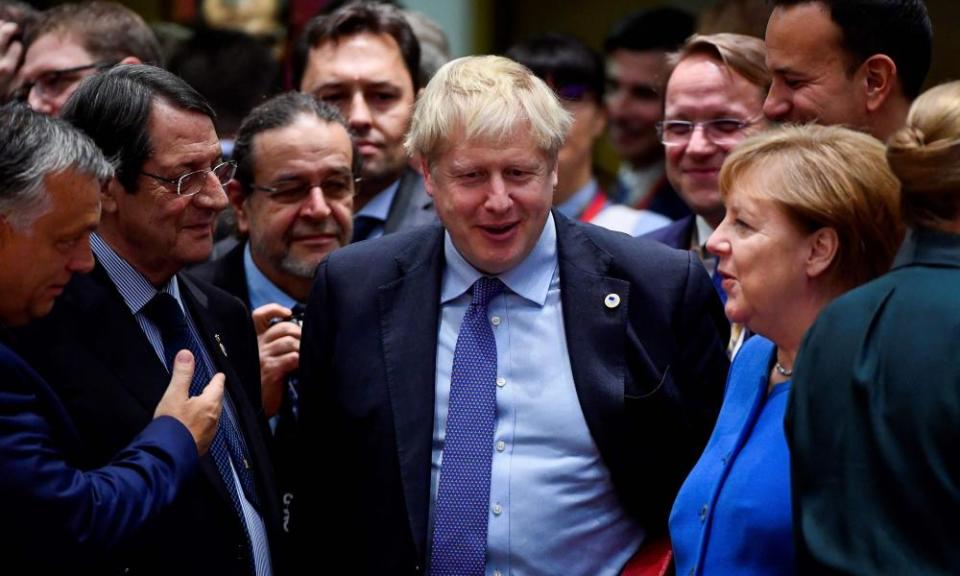The harder reality gets for Johnson, the tighter he clings to Brexit fantasy

Words do not often fail Boris Johnson. They are the tools that built his career, wielded for persuasion and deception, often at the same time.
But the gift has deserted him during the pandemic. His performances in parliament are halting and listless. It is a while since he seeded the national conversation with one of his trademark rococo phrases. No “doomsters and gloomsters”, “mutton-headed old mugwump” or “inverted pyramid of piffle”. He had a jaunty metaphor for flattening the peak of infection – “squash the sombrero” – but that was before he caught the disease. Covid-19 drained the colour from the prime minister’s speech as well as his cheeks.
He is miscast as a leader for dangerous times. The role demands responsibility and attention to detail. The Tory leader prefers a less gritty script, but government is about shovelling grit. There is an arduous journey between making promises and keeping them. Johnson outsources that discipline to others. Two terms as mayor of London taught him the value of letting aides do the unglamorous part of the job.
That is why he refused to sack Dominic Cummings for bending lockdown rules. Cummings is vital in Downing Street as a man who sees things through, bulldozing obstacles when others might try to negotiate around them. That trait appeals to Johnson on an intellectual as well as a practical level. The two men have similar self-regard as brilliant mavericks who can ignore rules meant for little people. But Cummings has arranged that arrogance into a pseudo-scientific doctrine (spelled out verbosely on his blog). Johnson’s version is a shapeless blob of intuition, half-learned history and cod classicism.
The chief strategist is the stiff mould into which the jelly of Johnson’s gut impulses is poured. Once set, the doctrine can then hold its shape, albeit with a wobble. That function is especially important for Eurosceptic ultras. When pressure over the lockdown breach was at its most intense, one device used to rally Tory MPs was the claim that Cummings must stay in No 10 to deliver the purest Brexit. The fear is that Johnson will be swayed by the case for extending transitional terms, blanching at the economic cost of a no-deal exit in December and lost popularity when manufacturing industries in marginal seats pay the price. Cummings is tasked with keeping a foot on the accelerator pedal as the cliff-edge comes into view. He is said to “keep the PM honest” on Brexit.
That is not “honesty” in the commonly understood sense of the word that involves verifiable truth. In the Eurosceptic usage it means loyalty to an idea of Brexit, for the sake of which all dishonesties are permitted. Long before rows over lockdown there were dodgy claims about Turkey joining the EU and £350m weekly budget contributions. Apparently, the higher truth of national liberation cancels out any devious means used to achieve it.
Johnson was a liar before he fronted Vote Leave but in a lazy, blundering way. He was into small-time, tactical fibbing that often backfired – making up quotes when he started out in journalism; denying an extra-marital affair when he served in Michael Howard’s shadow cabinet. (He was exposed and sacked both times.) Cummings honed that raw talent for deceit like a boxing coach who turns a back-alley street brawler into a heavyweight champ. Fighter and trainer need each other.
Brexit talks are the next title bout and, for the anti-Brussels hardcore, killing talk of extension beyond December is the prize. There is a round of negotiations this week but no one expects meaningful progress. The two sides are miles apart, accusing each other of stubbornness. It looks like a replay of last year’s nail-biter, which ended with Johnson crumpling at the last-minute, signing a deal on terms he had once rejected and calling it a victory.
Until recently, officials and business leaders on both sides of the Channel expected the same to happen again. They see the pandemic as an irresistible argument for postponing gratuitous economic disruption. But confidence that reason will prevail is draining away because it is hard to find anyone in government who sounds reasonable.
The chest-beating ideology that Tory MPs spout in public turns out also to be what many ministers say in private: freedom must be grabbed with both hands or Brussels will bind them with red tape; the cost of no deal is lower during a pandemic because trade volumes are depressed anyway; a shiny new economy driven by “industries of the future” will have to be built anyway, so Britain should not waste time on relations with rusty old Europe. They do not say this as part of an elaborate bluff. They believe it.
Related: Brexit talks: who is involved and what is being covered?
The prime minister will be more attached than ever to that script now because it gets him out of his gloomy Covid-19 pit, back to flights of optimism. He does not sound himself when urging caution. Hard truths are pitched below his natural vocal range. He will hate the solemn tones of the coming recession even more. He wants to be singing hymns to blue skies over Global Britain. The darker the horizon, the more he will need to believe in that brave new dawn, the more he will want to talk it into existence.
Even the prime minister’s allies do not describe him as a man of principle. He struggles with fidelity to people and facts. But his longest relationship is with rhetoric and it is a mistake to dismiss it all as bluster. The lies surround a solid kernel of belief – in himself and his role in Britain’s national destiny. It may seem counter-intuitive, given the reputation for dishonesty, but to really understand Boris Johnson it pays to take him at his word.
• Rafael Behr is a Guardian columnist

